Economic Theory and Policy \ 1-1

In this book, which is the eighth book in the "What You Need to Know in 40 Questions" series of books that provide short, practical and qualified answers to the questions of the reader about the practices or institutions related to Islamic economics, the subject of interest is discussed around 40 questions from various aspects. One of the main issues of the universal message sent by Allah (c.c.) to humanity is the prohibition of interest/riba. Because, interest is a practice that brings with it many harms, vices and evils in terms of religion, morality, social and economic aspects. The book deals with such an important subject as a whole; It has covered a wide area from its history to its implementation and the systems and discourses formed around it.

In this book, which is the second book of the Pocket Books series, which consists of books on the basic institutions and issues of Islamic economics, the subject of morality is tried to be explained in a content that can be easily understood by people of all levels, rather than a theoretical depth. Morality is one of the most fundamental issues that exist in all human societies. All economic, social and cultural systems are built on this foundation. Because morality is the set of basic values and rules that make it possible to live together with the society, in mutual solidarity and trust, which directs the instinctive desires of the individual to appropriate and legitimate social channels. The work in your hand deals with the place and role of morality in human life, which can be handled in a multi-dimensional and multi-dimensional way, in the context of economy, which is one of the most important relationship networks surrounding people in today's world. In this respect, in the first part of the work, the role of morality in the experience of living together, its relationship with law and religion, the reasons for the differences in business life are discussed, in the second part, the role of morality in the conduct of economic life is discussed, and finally, the effects of the marketization and globalization of the economy on morality are discussed.
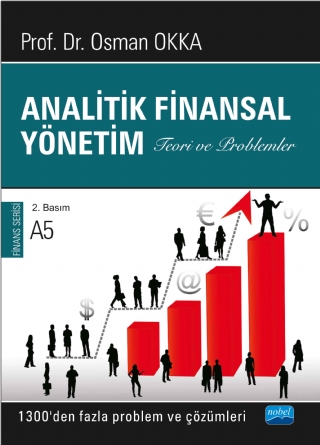
Although there are publications on verbal financial management in Turkey, there is a great deficiency in digital financial management. This study, which is prepared to compensate for this deficiency to some extent, includes more than 1,300 solved problems and tries to ensure that finance is experienced live in the company. Today, financial management education in our universities should be numerical, not verbal, as a requirement of the job. It is also clear that a financial education that is not pedagogically involved in company activities, cannot analyze and evaluate financial events, and is not effective in determining financial policies is not sufficient. The purpose of this book; It is to show the student and the reader how to solve simplified financial problems and to give sufficient financial knowledge on the relevant subject. While the theoretical information in the book was aimed to be at the basic level, it was thought to be at a very advanced level and the theoretical knowledge was concentrated in the book. The second purpose of the book is to prepare for the Financial Management Case Studies book. At the end of the book, the problems were emphasized and after the questions were solved, different orientation questions were asked for the student to test himself.

This book, titled Contemporary Approaches in the Field of Economics, Finance and Management, consists of the studies presented online at the International Participated Economic Research and Financial Markets Congress (IERFM) held in Konya between 15-17 October 2020 and deemed appropriate to be published after the editorial review.
The book consists of 7 chapters in total and the chapters have been prepared by scholars studying in the fields of economics, finance and management, market professionals and those working in the financial media. The latest developments regarding the subject addressed in each section have been shared, discussed, evaluations have been made to be a source of motivation for new studies. Thus, it was tried to contribute to the literature by filling knowledge gap on the subject.
Similarly, in the future IERFM Congresses, it has been planned that the studies deemed appropriate after the editorial reviews will be published as book chapters. In this book, it is aimed to analyze the current developments in the field of economics, finance and business management in a scientific level. In this context, it is expected that the book will provide added value to the academic studies and people dealing with science.
The book consists of 7 chapters in total and the chapters have been prepared by scholars studying in the fields of economics, finance and management, market professionals and those working in the financial media. The latest developments regarding the subject addressed in each section have been shared, discussed, evaluations have been made to be a source of motivation for new studies. Thus, it was tried to contribute to the literature by filling knowledge gap on the subject.
Similarly, in the future IERFM Congresses, it has been planned that the studies deemed appropriate after the editorial reviews will be published as book chapters. In this book, it is aimed to analyze the current developments in the field of economics, finance and business management in a scientific level. In this context, it is expected that the book will provide added value to the academic studies and people dealing with science.
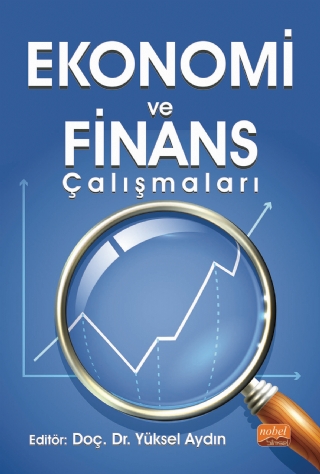
Evaluating the innovations provided by digital transformation in the economy and finance sector is one of the most important issues. Today, increasing economic relations between countries constitute the structure that develops the financial sector. It is seen that the various dynamics that occurred in different periods have a quality that will affect many countries, and that they have a slowing effect on economic and financial development from time to time. Understanding the place of global trends in economic and financial theory in this developing structure draws attention in terms of ensuring effectiveness in policy measures. In this context, current developments in the world economy and finance sector have been the main point of view in the preparation of this book. Our book, which includes theoretical and applied studies, consists of two main parts. In our book, which includes a total of 23 chapters, each chapter has been prepared by academics who are experts in their fields. It is aimed that this book will contribute to researchers and students working in the field of economics and finance.

Islamic economy/economics, which emerged as a concept in the 1930s, started to develop theoretically after the 1970s and became an academic field of study. This work presents the positions of the basic micro and macro issues of economics in this new field of study, both theoretically and
It is intended to demonstrate in practical terms. In this context, subjects such as methodology, political economy systems, state-market relations, fiscal and monetary policy, consumer and producer analysis, institutions are included. This book, which is structured to be used as an introductory one-semester course book in Islamic economics in terms of subject progression and segmentation, is also preferable for anyone interested in the subject because it does not have a heavy academic language. With the hope that it will contribute to the field as an original work written in Turkish, as well as related translation works published by İktisat Publishing until today...
It is intended to demonstrate in practical terms. In this context, subjects such as methodology, political economy systems, state-market relations, fiscal and monetary policy, consumer and producer analysis, institutions are included. This book, which is structured to be used as an introductory one-semester course book in Islamic economics in terms of subject progression and segmentation, is also preferable for anyone interested in the subject because it does not have a heavy academic language. With the hope that it will contribute to the field as an original work written in Turkish, as well as related translation works published by İktisat Publishing until today...

In this book, which is the eighth book in the Pocket Books series, which covers the basic institutions and issues of Islamic economics, the subject of utility is tried to be explained in a content that can be easily understood by people of all levels, rather than a theoretical depth. The book examines the meaning, role and importance of the concept of utility in modern economics and Islamic economic theory, taking into account the evolution of the concept over time. Accordingly, the book is organized into four parts. In the first part; The approach in which utility is defined as the ability of goods to meet human needs is discussed. In the second part; The approach in which benefit is defined as the satisfaction, pleasure and happiness obtained from the consumption of goods and services, that is, the "cardinal approach to benefit" has been examined. In the third part; The modern approach to the concept of utility, the "ordinate to utility" approach, in which utility is included in the analysis as a way to rank consumer preferences, is explained. In the fourth chapter, the framework of the concept of utility in Islamic economics is drawn and its differences from mainstream economics are explained.
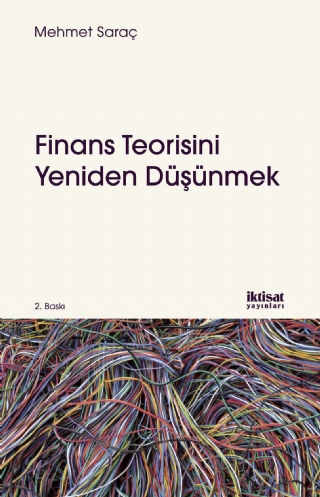
While the theoretical questioning of finance, which is a relatively young specific field among the sciences, is actually being questioned, the world view and human perception on which neoclassical economics is based, and perhaps beyond that, neoclassical economics is also questioned. While doing this, the source of knowledge, the methodology of science, how the Enlightenment process gave direction to these issues and the future of the concept of scientific knowledge are also included in the discussion to a certain extent.
Today, the most questionable point of conventional economics and the finance discipline derived from this understanding is that the epistemology of the economics and finance understanding and the assumptions on which it is based do not fully grasp the reality of human and existence. For this reason, post-modern humanity struggles with crises, cannot establish a sustainable economic system and is deprived of a fair distribution of wealth. This book deals with the debates, critical views, new trends and new paradigm searches, which have become more evident especially after the crises, regarding the theory of finance as a scientific field of study and the global financial system in terms of practice.
Today, the most questionable point of conventional economics and the finance discipline derived from this understanding is that the epistemology of the economics and finance understanding and the assumptions on which it is based do not fully grasp the reality of human and existence. For this reason, post-modern humanity struggles with crises, cannot establish a sustainable economic system and is deprived of a fair distribution of wealth. This book deals with the debates, critical views, new trends and new paradigm searches, which have become more evident especially after the crises, regarding the theory of finance as a scientific field of study and the global financial system in terms of practice.
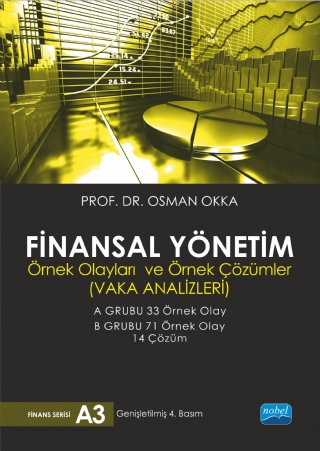
The first edition in 2005, the second in 2009, the third in 2013, and now the fourth edition in 2018, "Financial Management Case Studies and Case Studies" has been prepared for use in undergraduate, graduate and doctoral programs at our universities. The number of cases, which was 50 in the first edition, 62 in the second edition, and 71 in the third edition, was arranged over 104 cases, including 33 cases in undergraduate level, 71 in group B at graduate and doctorate level in the fourth edition, and also 71 group B case studies (cases) were updated.
In order to understand the problems of the financial manager and the role of finance theory correctly and to be able to make accurate financial decisions about the company in today's world dominated by extreme competition and high capital costs, our students and readers should closely see financial management problems taken from real life and turned into case studies and They need to find solutions to these problems. According to our research, students perceive, formulate, prepare for a solution, take the right decision by solving, and have difficulty in risk management, a financial problem they encounter in real life, starting from the textbooks or small financial problems in the books. For this reason, these case studies are; It is prepared for our readers to see themselves in the virtual environment of the company, to penetrate deeply into financial management problems, to develop alternative solutions and to improve their ability to make the right decision, that is, it acts as a finance simulator for financiers.
In order to understand the problems of the financial manager and the role of finance theory correctly and to be able to make accurate financial decisions about the company in today's world dominated by extreme competition and high capital costs, our students and readers should closely see financial management problems taken from real life and turned into case studies and They need to find solutions to these problems. According to our research, students perceive, formulate, prepare for a solution, take the right decision by solving, and have difficulty in risk management, a financial problem they encounter in real life, starting from the textbooks or small financial problems in the books. For this reason, these case studies are; It is prepared for our readers to see themselves in the virtual environment of the company, to penetrate deeply into financial management problems, to develop alternative solutions and to improve their ability to make the right decision, that is, it acts as a finance simulator for financiers.
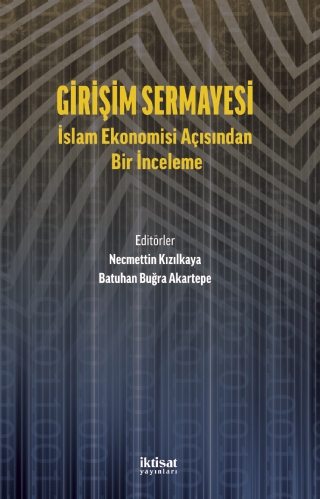
There have been people who are creative and have new ideas throughout history. These ideas led to the development of alternative models outside of the ongoing economic habits and opened the door to innovations.
Today, many innovations, especially in the field of technology, emerge as a result of the maturation of such ideas. Venture/venture capital is an important financial instrument in this respect, which refers to being a partner in these initiatives in order to meet the funding needs of individuals and companies with new ideas. It is an important feature of this partnership that one party takes the risk and aims to earn long-term returns by putting forth the capital of the other party and the creative thinking of the other party. In this respect, venture capital is an alternative model different from classical financing models. The profit-loss-based partnership structure in venture capital is suitable for the objectives that Islamic Economics wants to achieve. For this reason, it is an important investment tool that public and private institutions, universities and companies can apply, especially participation banks. This book in your hand examines the history, current situation, legal structure, economic opportunities, tax and accounting dimensions of venture capital. In this respect, it aims to fill an important gap in this issue, which has been neglected in terms of both theory and practice.
Today, many innovations, especially in the field of technology, emerge as a result of the maturation of such ideas. Venture/venture capital is an important financial instrument in this respect, which refers to being a partner in these initiatives in order to meet the funding needs of individuals and companies with new ideas. It is an important feature of this partnership that one party takes the risk and aims to earn long-term returns by putting forth the capital of the other party and the creative thinking of the other party. In this respect, venture capital is an alternative model different from classical financing models. The profit-loss-based partnership structure in venture capital is suitable for the objectives that Islamic Economics wants to achieve. For this reason, it is an important investment tool that public and private institutions, universities and companies can apply, especially participation banks. This book in your hand examines the history, current situation, legal structure, economic opportunities, tax and accounting dimensions of venture capital. In this respect, it aims to fill an important gap in this issue, which has been neglected in terms of both theory and practice.

When we look at the developments in the philosophy of science in the last hundred and fifty years, it is seen that the method of natural sciences is dominant in the method of social sciences. The separation of economics from philosophy, which is thought to progress by using advanced mathematics and technique, has been criticized by twentieth century economists and other social scientists, and these criticisms have led to different epistemological and ontological searches in social sciences from natural sciences. Especially with the development of ontological hermeneutics, the research subject and content of economics has started to be questioned again through the mutual relationship between the individual and society.
In this book, which is prepared for readers who are interested in economics and other social sciences as well as the philosophy of science, the nature of the mutual dynamic relationship between the individual and society as the main research topic of economics has been opened to discussion in different periods and thinkers, thus trying to bring an ontological dimension to the mainstream economy. A critical perspective is presented to the methodology of economics.
In this book, which is prepared for readers who are interested in economics and other social sciences as well as the philosophy of science, the nature of the mutual dynamic relationship between the individual and society as the main research topic of economics has been opened to discussion in different periods and thinkers, thus trying to bring an ontological dimension to the mainstream economy. A critical perspective is presented to the methodology of economics.

Do people always act rationally when making economic decisions? Are the balances in economic life best established spontaneously? Does economic development always increase welfare and happiness? Why do people make systematic mistakes when they have unlimited billions of experiences? How influential are our cognitive biases on our decisions? Why are those who know a lot wrong? Why does our body begin to believe what our brain believes after a while? Why do we give different answers and irrational responses to different questions, according to the way they are presented? How happy is it to consume in a postmodern world where needs turn into wants?
Are there things money can't buy? Is there happiness with money? Is it possible for Mesut from Mesudiye to be happy in today's postmodern world? What message does Agent Smith give to a person who is immersed in the rational and linear world? In what way do religious and moral values affect economic life in a society where most things are judged by market conditions? Why is the blood given in return for less quality and why is there more disease in this blood? Is it possible to explain the unreasonable enthusiasm and excitement that moves people even in the most negative moments with rational factors? Does two and two always make four in social and economic life? Longer and longer questions and answers always hidden somewhere...
Rationality and Irrationality in Economics opens the doors of a happy social and economic life. It gives tips on living in a balanced and measured way between a rational and irrational world. He's trying to find the real man and economics that gets rid of his cognitive biases. It reminds us once again that money cannot buy everything and that man is not a machine. It is time to question the traditional paradigm more in order to be happier in a postmodern world where there are serious disconnects between economics and morality.
Are there things money can't buy? Is there happiness with money? Is it possible for Mesut from Mesudiye to be happy in today's postmodern world? What message does Agent Smith give to a person who is immersed in the rational and linear world? In what way do religious and moral values affect economic life in a society where most things are judged by market conditions? Why is the blood given in return for less quality and why is there more disease in this blood? Is it possible to explain the unreasonable enthusiasm and excitement that moves people even in the most negative moments with rational factors? Does two and two always make four in social and economic life? Longer and longer questions and answers always hidden somewhere...
Rationality and Irrationality in Economics opens the doors of a happy social and economic life. It gives tips on living in a balanced and measured way between a rational and irrational world. He's trying to find the real man and economics that gets rid of his cognitive biases. It reminds us once again that money cannot buy everything and that man is not a machine. It is time to question the traditional paradigm more in order to be happier in a postmodern world where there are serious disconnects between economics and morality.
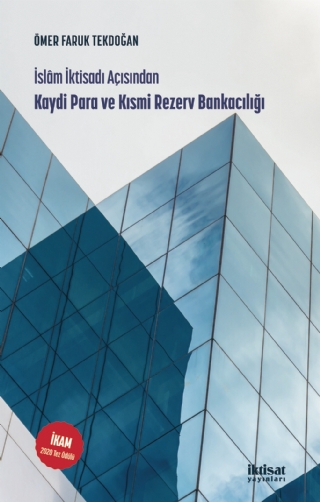
The partial reserve system, which we can call the basis of modern finance, has been the subject of discussion from past to present due to its weak structure, the role it played in economic instability and the problems it created. This interest-based system, which ensures that most of the money supply is dematerialized, has led to a macro-ribâ system that envelops economic life. The full reserve system, which was developed as an alternative to this system, could not find its place in practice. From the point of view of Islamic economics, the fact that the current system is riba-oriented and causes an unfair distribution of resources has necessitated the evaluation of the alternatives put forward from this perspective. The fractional reserve system operates based on confidence that commercial banks and central banks will provide sufficient liquidity when needed, and thus in essence it is prone to financial crises.
is weak and fragile. From this perspective in the book, the problems that are claimed to arise in economies with the discovery of fractional reserve banking are examined, the applicability of full reserve banking and how sufficient it is for a solution are examined, and the suitability and drawbacks of both systems in terms of Islamic economics are discussed. In addition, the effect of both banking systems on economic stability was compared using an agent-based simulation model.
is weak and fragile. From this perspective in the book, the problems that are claimed to arise in economies with the discovery of fractional reserve banking are examined, the applicability of full reserve banking and how sufficient it is for a solution are examined, and the suitability and drawbacks of both systems in terms of Islamic economics are discussed. In addition, the effect of both banking systems on economic stability was compared using an agent-based simulation model.
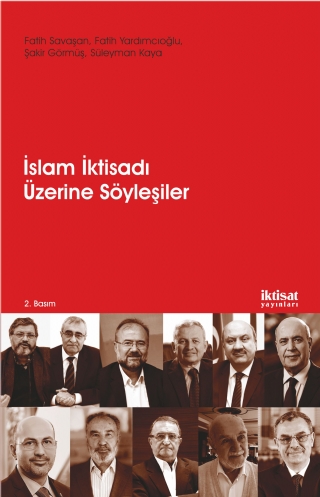
Many issues such as what the economic view of Islam is, whether it offers an economic system, what solutions it provides to people's needs, and through which institutions historically Muslims carry out their economic activities have been discussed by different segments for a long time and still continue to be discussed. Not only theoretical efforts, but also many practical efforts have been put forward and institutions have been established. Sometimes the practice side, led by Islamic banks, directed other theoretical studies, and sometimes the theory tried to influence the practice. On the other hand, with the growth of Islamic finance, regulatory authorities have inevitably been included in this ecosystem. In the end, many stakeholders, interconnected or not, ponder on Islamic economics and finance and contribute to keeping this field on the agenda.
Studies in the field of Islamic economics and finance have increased for Turkey, especially after the 1980s. Islamic lawyers, employees in the Islamic finance sector, regulatory agencies, academics and many more contribute to the field. Among them, some names played leading roles in their own fields and have been influential in the reaching of Islamic economics and finance to a much wider audience today. This book consists of interviews with professors who have worked in this field for many years, industry representatives and regulators operating in the field of Islamic finance.
Studies in the field of Islamic economics and finance have increased for Turkey, especially after the 1980s. Islamic lawyers, employees in the Islamic finance sector, regulatory agencies, academics and many more contribute to the field. Among them, some names played leading roles in their own fields and have been influential in the reaching of Islamic economics and finance to a much wider audience today. This book consists of interviews with professors who have worked in this field for many years, industry representatives and regulators operating in the field of Islamic finance.

In the face of Europe's industrialization revolutions and its formation as developed economies, the Islamic world's inability to fully fulfill its growth and development steps has led to a misconception that Islam hinders development or progress for years. This perception has been expressed from time to time by some circles with good intentions or bad intentions. Is it really so? Does Islam have a religious understanding that only has an aspect towards the hereafter and is completely isolated from worldly life? How should the chapters in the Qur'an and hadiths that describe the dangers of wealth be understood? Does Islam have a relationship with capitalism and socialism? Can a Muslim be rich? Are there any rules for being rich and wealthy? What should be the balance between spending and hedonism? The fact that all these questions are often wrongly answered and misinterpreted by both the Islamic and non-Islamic worlds is an indication that the issue is not fully understood. Although this misunderstanding is considered reasonable by those who are far from the Islamic world, it is very sad that it is misunderstood and interpreted by the Islamic world.
In this study, the subject is evaluated from the perspective of Islam by considering the assumptions and approaches in Max Weber's work, which deals with the relationship between Protestant ethic and capitalism, and which is very popular. Can relationships similar to those established by Max Weber between capitalism and Protestant ethics be valid for the religion of Islam, or can similarities be drawn? In this study, the real Islamic economic system has been tried to be revealed by considering the subject in terms of these relations.
In this study, the subject is evaluated from the perspective of Islam by considering the assumptions and approaches in Max Weber's work, which deals with the relationship between Protestant ethic and capitalism, and which is very popular. Can relationships similar to those established by Max Weber between capitalism and Protestant ethics be valid for the religion of Islam, or can similarities be drawn? In this study, the real Islamic economic system has been tried to be revealed by considering the subject in terms of these relations.

The latest information and principles, which have gained an international character in the field of contemporary business, are prepared in the book, which has been prepared by carefully evaluating both the developments in the literature and the new practices in the business world in the 2000s, on all subjects within the scope of business administration, from its establishment to its operation, and especially on business economics and management. techniques and strategies have been systematically studied. In particular, the basic subjects and concepts of business, the establishment of the business, management, production, marketing and finance functions are discussed in detail.
This book is suitable for the students of Faculties of Economics and Administrative Sciences, Faculties of Business and Engineering and Vocational Schools, which include courses such as business administration, business economics, business management, management and organization, production, marketing and finance, as well as Engineering faculties who have felt the weight and importance of business in recent years. It is a reference source for students.
This book is suitable for the students of Faculties of Economics and Administrative Sciences, Faculties of Business and Engineering and Vocational Schools, which include courses such as business administration, business economics, business management, management and organization, production, marketing and finance, as well as Engineering faculties who have felt the weight and importance of business in recent years. It is a reference source for students.

In this study, it is aimed to explain the basic information about both development and growth economics and economic design, which is the building block of modern development theory. It is thought that some of the information in the study is important in terms of drawing a framework that will allow a better understanding of New Development. In addition, some important information about the content of economics as a concept is also included in the study in the light of the thoughts of Alfred Marshall and John Maynard Keynes.
The contents of the second edition are briefly as follows: In the first chapter, a conceptual introduction has been made. In the second part, some features of underdeveloped countries are explained using current data. The third chapter describes the colonial past of the underdeveloped countries. In the fourth chapter, the differences between the past and present meanings of development economics are explained. At the end of this section, it is once again emphasized that New Development means economic design. In the fifth chapter, development theories and in the sixth chapter basic information about economic design are given. The seventh chapter is on the objective function as an important element of economic design. In this section, microeconomic objectives are explained by matching them with development objectives. In the eighth chapter, Marshallian, Keynesian and ethical origins of economics and development design are presented. In the ninth chapter, after the basic concepts of economic growth are given, in the tenth chapter, the demand constraint in economic growth is explained. In the eleventh chapter, after presenting the difference between growth and catch-up, demand constraint in the catch-up process is explained in the context of middle-income trap. In the twelfth chapter, the role of foreign direct investments in the capture process is shown using Findlay's model. In the last chapter, the problem of infrastructure in development and growth design has been addressed within the framework of transportation.
The contents of the second edition are briefly as follows: In the first chapter, a conceptual introduction has been made. In the second part, some features of underdeveloped countries are explained using current data. The third chapter describes the colonial past of the underdeveloped countries. In the fourth chapter, the differences between the past and present meanings of development economics are explained. At the end of this section, it is once again emphasized that New Development means economic design. In the fifth chapter, development theories and in the sixth chapter basic information about economic design are given. The seventh chapter is on the objective function as an important element of economic design. In this section, microeconomic objectives are explained by matching them with development objectives. In the eighth chapter, Marshallian, Keynesian and ethical origins of economics and development design are presented. In the ninth chapter, after the basic concepts of economic growth are given, in the tenth chapter, the demand constraint in economic growth is explained. In the eleventh chapter, after presenting the difference between growth and catch-up, demand constraint in the catch-up process is explained in the context of middle-income trap. In the twelfth chapter, the role of foreign direct investments in the capture process is shown using Findlay's model. In the last chapter, the problem of infrastructure in development and growth design has been addressed within the framework of transportation.

This work examines the concepts of property, property and market, which are the main subjects of economics, from the perspectives of both Islamic and conventional economics. Goods are the basis of economic life, because goods are the name of the means that meet the needs of people. Man has material and intangible needs. A person pursues them all his life. If his material needs are met, he will be prosperous, and if his intangible needs are met, he will attain happiness. People try to acquire property from the moment they know themselves. The name of owning and owning a property is called property. Property entitles people to that property and provides the right to dispose and use it. This is also called "possession". Normally, people buy the goods by giving their money. The sale process is also done in the bazaar, in the market. The word market, which comes from Italian, is used in the sense of market. The movable goods are both displayed and sold in the bazaars, shops, week markets, stock exchanges, formerly fairs and now fairs. Real estates are bought and sold in the land registry offices of the state.
In this work, the author analyzed the definition and properties of goods, their moral evaluation, the subject of ownership, the ownership of production factors, and the protection of property, both from a secular and Islamic point of view, in his six-part analysis.
In this work, the author analyzed the definition and properties of goods, their moral evaluation, the subject of ownership, the ownership of production factors, and the protection of property, both from a secular and Islamic point of view, in his six-part analysis.

For every economics reader, theoretical as much as possible, experience and practical point of view gained within the framework of obtained observations are a necessity. The authors of the microeconomics book you have, especially in the preface and introduction, explain why their books are different from the current Turkish books taught in the field. In short, a method based on "learning by doing" and providing guidance to the students is followed in the book: The book contains a theoretical integrity that will respond to the demands of undergraduate and graduate students. Topics that complement each other are primarily explained with geometric figures; When necessary, the proof mechanism is given importance with the help of algebra. Solved problems in the content, reading passages, sometimes case studies and chapter suffixes that are compatible with the integrity of the subject are at a level that will meet the expectations of both instructors and students who want to be economics readers. As it is known, the more the theories of microeconomics are internalized, the more successful the entrance exams for the profession. The welfare contribution provided by the success of being a good economics reader is always felt.
While working at Nişantaşı University, Professor Recep KÖK, one of the authors of this textbook, is still working at Dokuz Eylül University (2019), Assoc. Oğuz KARA (Duzce University), Assoc. Dr. Üzeyir AYDIN (Dokuz Eylül University), Dr. Lecturer A. Elif AY YALÇINKAYA (Dokuz Eylül University) has revived the “team spirit” again: Authors have published many books, articles, etc. related to the field. It can be said that KÖK's professional experience of more than forty years is the main factor in bringing this work, which is a reputation of common will and effort, to the publication life. With the contribution of our publishing house, we hope that this privileged book, which has been included in the list of Turkish textbooks published in Turkey, will provide significant support to the teaching of economics! Of course, its readers' evaluations and appreciation of the book are beyond any value.
While working at Nişantaşı University, Professor Recep KÖK, one of the authors of this textbook, is still working at Dokuz Eylül University (2019), Assoc. Oğuz KARA (Duzce University), Assoc. Dr. Üzeyir AYDIN (Dokuz Eylül University), Dr. Lecturer A. Elif AY YALÇINKAYA (Dokuz Eylül University) has revived the “team spirit” again: Authors have published many books, articles, etc. related to the field. It can be said that KÖK's professional experience of more than forty years is the main factor in bringing this work, which is a reputation of common will and effort, to the publication life. With the contribution of our publishing house, we hope that this privileged book, which has been included in the list of Turkish textbooks published in Turkey, will provide significant support to the teaching of economics! Of course, its readers' evaluations and appreciation of the book are beyond any value.

In Turkish Financial Reporting Standards and International Financial Reporting Standards (TFRS/IFRS), related to financial instruments; There are 4 (four) standards: TMS/UMS 32: Financial Instruments: Presentation, TMS/UMS:39 Financial Instruments: Recognition and Measurement, TFRS/IFRS 7: Financial Instruments: Disclosures, TFRS/IFRS 9: Financial Instruments standards.
In the study, the principles of presentation with TAS / IAS 32, accounting (reporting) and valuation principles with TMS / IAS 39, and public disclosure principles with TFRS / IFRS 7 are examined with examples and contributed to the implementation of financial instruments in an impartial and effective manner. intended to be.
In line with these purposes; Definition, presentation, classification, valuation (measurement) of financial instruments, footnote explanations, reporting of derivative financial instruments and hedge accounting are tried to be explained with examples.
In the study, the principles of presentation with TAS / IAS 32, accounting (reporting) and valuation principles with TMS / IAS 39, and public disclosure principles with TFRS / IFRS 7 are examined with examples and contributed to the implementation of financial instruments in an impartial and effective manner. intended to be.
In line with these purposes; Definition, presentation, classification, valuation (measurement) of financial instruments, footnote explanations, reporting of derivative financial instruments and hedge accounting are tried to be explained with examples.

Indirect or intermediary financing plays a vital role in today's contemporary financial systems. Even in directly financed markets, it is often not possible for market participants to trade individually and they need to get services from specialized financial intermediaries. Thus, the roles and activities of financial intermediaries have increased more than ever before. It is well known to those who are familiar with the subject that banks have always had a very important place among financial intermediaries. It is also well known that commercial banks or deposit banks play a dominant role among the types of banks such as investment banks, development banks or participation banks.
It is observed that commercial banks, which are the leading players of bank-based financial systems, are increasingly dominating market-based financial systems. Although investment banks have a significant weight in market-based systems, it is seen that commercial banks have increasingly penetrated into this area in the last two decades, with the effect of financial liberalization trends. The same trend is strongly felt in other areas of finance, particularly in the insurance sector, with practices such as bancassurance.
One of the most important reasons why commercial banks are in a superior position even in different types of financial systems is that they turn into supermarkets of financial products and services over time, suppressing other types of intermediation in the system by using their space and economies of scale advantages. Today, customers who demand financial products and services go to meet all their needs through commercial banks, as they save a lot of time and money. Indeed, with their widespread branch networks, internet branches, advanced technology-based applications such as mobile and telephone banking, commercial banks can serve their customers on a 24/7 basis, almost anywhere.
This book covers the basic principles and theories of the management of commercial banks, which have a central role in today's contemporary financial systems and have now become almost the dominant type of intermediation. Within the scope of financial management principles of banks; Topics such as the management of the bank firm and its branches, the fund raising and utilization strategies of banks, pricing and marketing strategies specific to banks are covered. Written at undergraduate and graduate levels, the book is a resource that can be easily used at the associate degree level, ignoring some technical issues. In addition, we believe that the book will be useful in providing a general vision to readers who are interested in banking or who are just starting out in this profession.
It is observed that commercial banks, which are the leading players of bank-based financial systems, are increasingly dominating market-based financial systems. Although investment banks have a significant weight in market-based systems, it is seen that commercial banks have increasingly penetrated into this area in the last two decades, with the effect of financial liberalization trends. The same trend is strongly felt in other areas of finance, particularly in the insurance sector, with practices such as bancassurance.
One of the most important reasons why commercial banks are in a superior position even in different types of financial systems is that they turn into supermarkets of financial products and services over time, suppressing other types of intermediation in the system by using their space and economies of scale advantages. Today, customers who demand financial products and services go to meet all their needs through commercial banks, as they save a lot of time and money. Indeed, with their widespread branch networks, internet branches, advanced technology-based applications such as mobile and telephone banking, commercial banks can serve their customers on a 24/7 basis, almost anywhere.
This book covers the basic principles and theories of the management of commercial banks, which have a central role in today's contemporary financial systems and have now become almost the dominant type of intermediation. Within the scope of financial management principles of banks; Topics such as the management of the bank firm and its branches, the fund raising and utilization strategies of banks, pricing and marketing strategies specific to banks are covered. Written at undergraduate and graduate levels, the book is a resource that can be easily used at the associate degree level, ignoring some technical issues. In addition, we believe that the book will be useful in providing a general vision to readers who are interested in banking or who are just starting out in this profession.
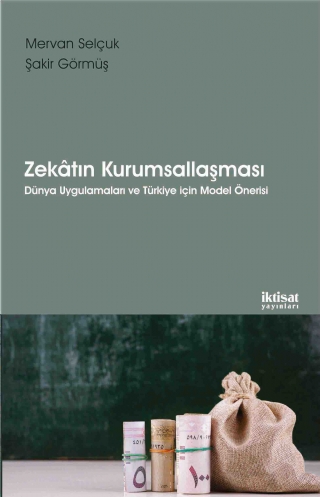
The connection of Muslims with zakat has decreased day by day and has almost reached the breaking point. It is seen that there is a decrease in the number of people who calculate zakat in accordance with its originality and deliver it to those who deserve it. While the zakat potential of Islamic countries can easily eliminate the problems of income distribution and poverty, the insufficient institutionalization of zakat causes many socio-economic problems and an inability to effectively combat existing problems. Hz. Although it cannot be collected and distributed under the authority of the state and forcibly, as in the Sunnah of the Prophet (pbuh), it is seen that zakat is tried to be implemented in an institutional structure with state support in countries such as Malaysia, Indonesia and Pakistan. In this study, information about the countries where zakat is applied in an institutional structure is given and these zakat institutions are examined comparatively. In the light of this information, taking into account the existing legal and institutional structures, a model has been created for a modernly applicable zakat institution in Turkey.